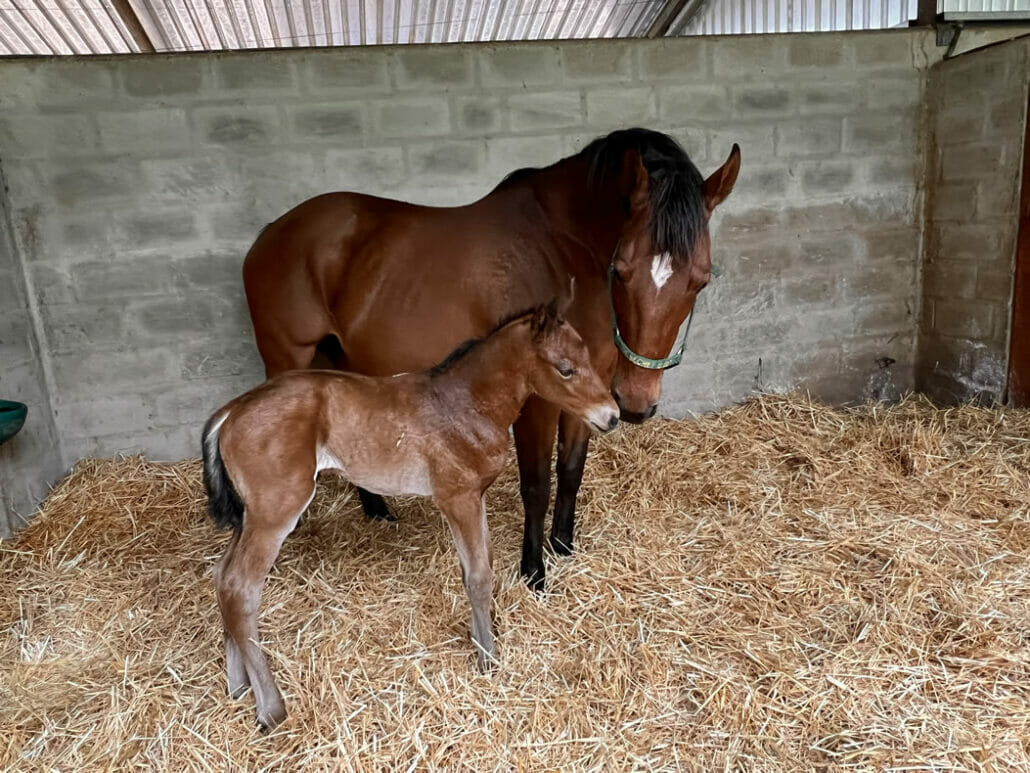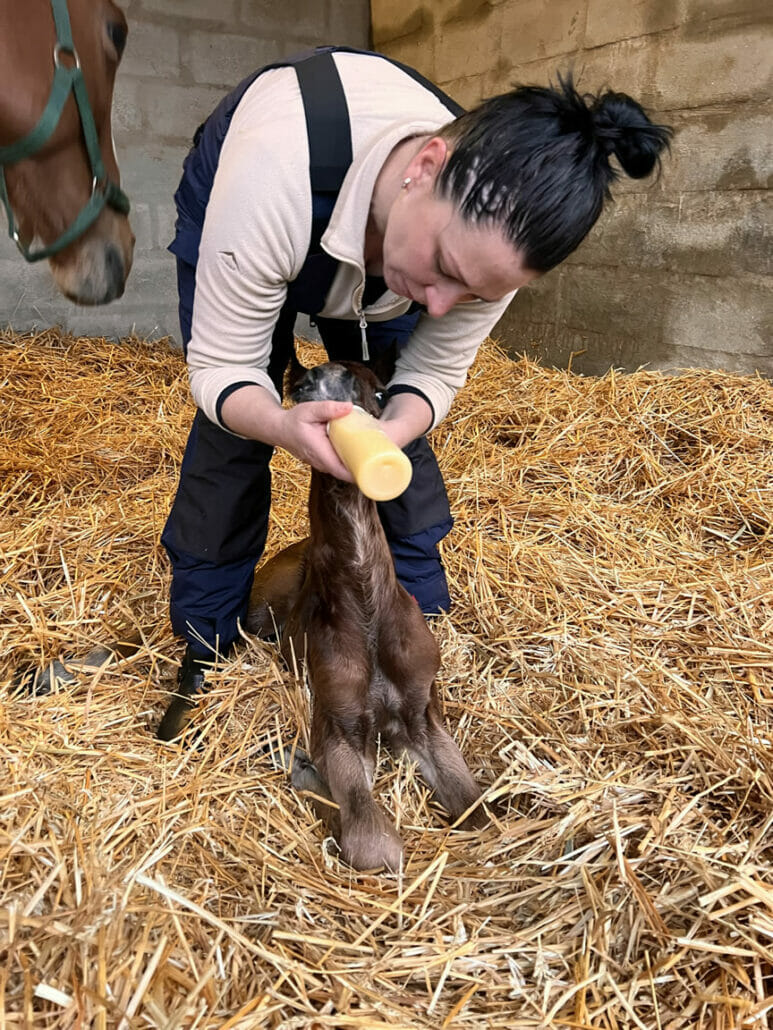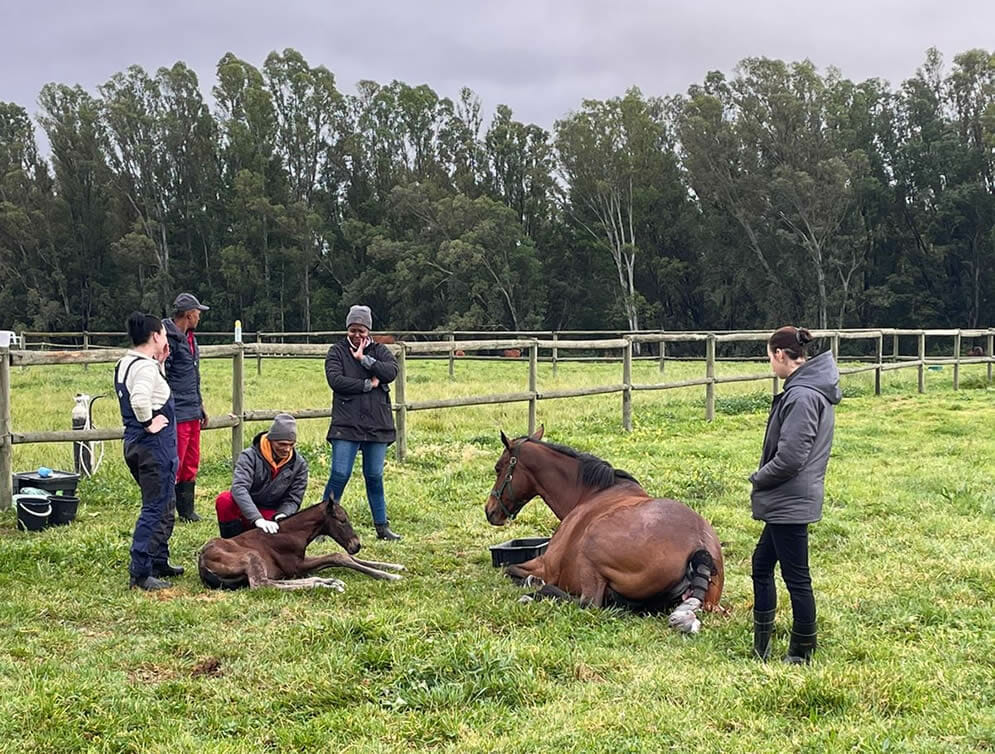The Miracle Of New Life
The most wonderful time of the year
Foaling season has been upon us and with that come the stories of joy, distress, celebration, excitement and hope.
In fact, if it’s an emotional rollercoaster you want to go on, then strap yourself in and speak to a stud farm manager around this time of year.
Gary Lemke writes that someone who is no stranger to the miracles of birth is Kuda’s Bloodstock Product manager Jo Campher.
A familiar face mingling among clients on race days and at the various Sales that pop up on the annual calendar, she is just as “at home” standing in the straw in a 4m x 4m foaling box helping deliver another newborn into the world.
“This is really the most wonderful time of the year,” she gushes.

And so another typical day dawned towards the end of September when a WhatsApp group lit up with a photo of Campher, her hair tied back after a sleepless night and dressed in dungarees, feeding a foal from a bottle.
“That’s how my morning started!” she exclaimed, excitedly. “I’m in my element!”
Campher was at Klawervlei Stud where she had been part of a team that had just delivered a filly out of The Secret is Out who had been covered by boom sire Vercingetorix.
We also delivered a colt by Querari out of Quite Frankly two hours earlier. This was right in the middle of the devastating storms and floods which swept the Cape and caused widespread damage to farms in the area, including Hassen Adams’ Nadeson Park Stud.
“We are all okay here at Klawervlei,” she reported, “but the river pushed up high. “Eskom is down so we don’t have power and the water supply has also been cut.”
Fast forward a fortnight and Campher, who joined Kuda in 2018, had time to reflect on the drama that was Heritage Day weekend.
“I spent most of that weekend at Klawervlei,” she said.
“We foaled two babies that were just two hours apart. Foaling at Klawervlei has become something of a tradition for me. The Klawervlei team taught me how to foal on one of my first trips to the farm during season in 2018 and the team of assistants always make me feel welcome. I love the experience and learning on the job. It’s very draining, physically and mentally, but also very rewarding.

“I love watching the world-class vets do their thing and assist where I can by handing them their equipment and tools when requested, ask questions and absorb as much information as possible. I had planned to visit Ridgemont and Maine Chance as well that weekend but the rain put paid to those plans. I will try and make plans to go soon now that the weather has improved.
“It’s all about reading the situation, working closely with the foaling and foal watch team. We get summoned when a mare’s water breaks and then we follow all the protocols until the foal is standing and managing to stay upright on their long, unsteady legs. It really is a miracle unravelling in front of your eyes.
“We then check on them until they go drink from the mare unassisted. Everything is documented, from the time the mare’s water breaks to the new-born’s weight to specific times of them making progress. There’s always such excitement and with so many offspring coming from impeccable bloodlines, there’s much excitement because we could be having a look at a Grade One champion of the future.”

Although Campher has had a diverse career, which includes doing hospitality work on yachts in the Mediterranean, living in Canada and studying to be a chef, these past five years she has been at her happiest.
“I grew up amongst horses,” she says.
“I have been riding since the age of four and come from a ‘horse family’. My Dad showed American Saddlebreds and I did show jumping and earned South African colours in American Saddlebreds and showing. I have been fortunate to ride racehorses as well, with the likes of Michelle Rix, Bass Racing and Justin Snaith accommodating me on occasions when they have taken a string to the beach.”
She has experienced the ups and downs of the equine industry, which is why she’s found a perfect home from home at Kuda, and it has been such since chief executive Wehann Smith brought her on board.
“Having ridden and been involved with horses most of my life, I understand that accidents, illness and injury occur. I was heartbroken when I lost my top show horse to colic shortly before national trials. I have educated myself in the ‘downside’ of things and I honestly believe that I have a connection with horses as much as I do with people.
“Unfortunately, racehorses, just like other horses, are as prone to unexpected and sudden health issues and illnesses as humans, as much as we don’t necessarily like to talk about it.”
And so, another cycle is completed.
Pregnancy lasts about 340 days, or 11 months, but birth can occur as early as 310 days, or as late as 384 days. At birth, the umbilical cord parts naturally as the mare stands up, with assistance from the team ready to sterilise the navel, around 10 to 15 minutes afterwards. The foal usually rests for a while and stands up after 30 minutes to an hour.
And, as we have come to see over and over, when it comes to the nitty gritty of the thoroughbred industry, Campher is at her happiest when she has her sleeves rolled up, letting her actions speak louder than any words ever could.
